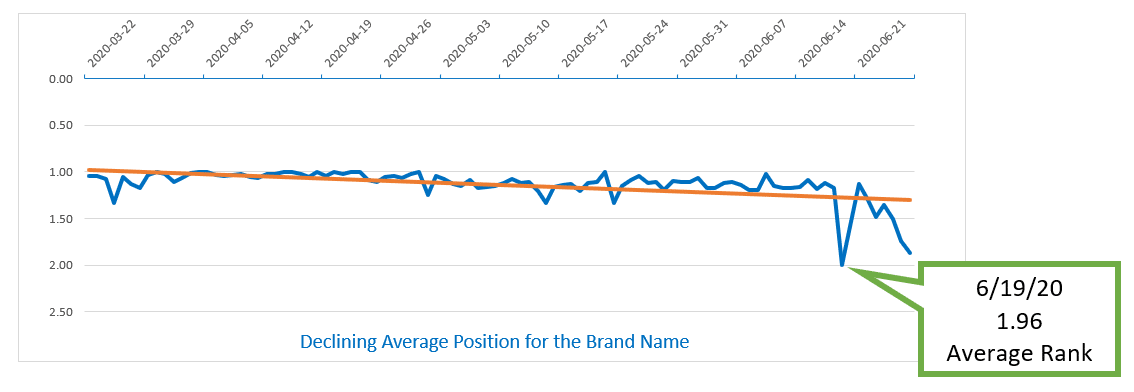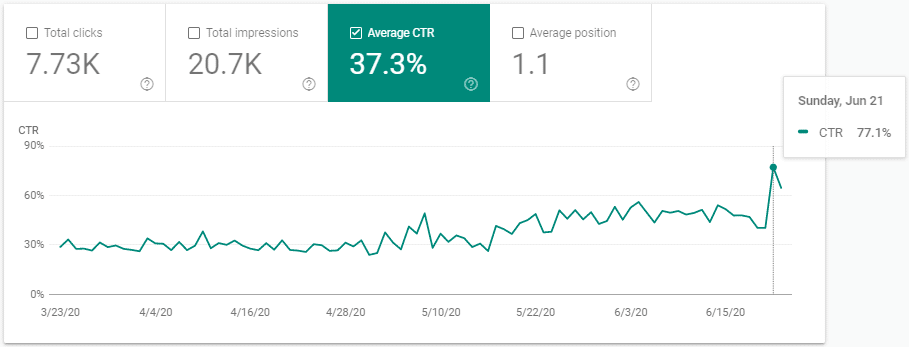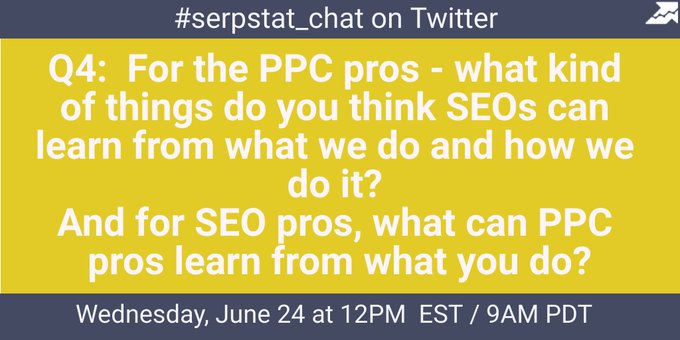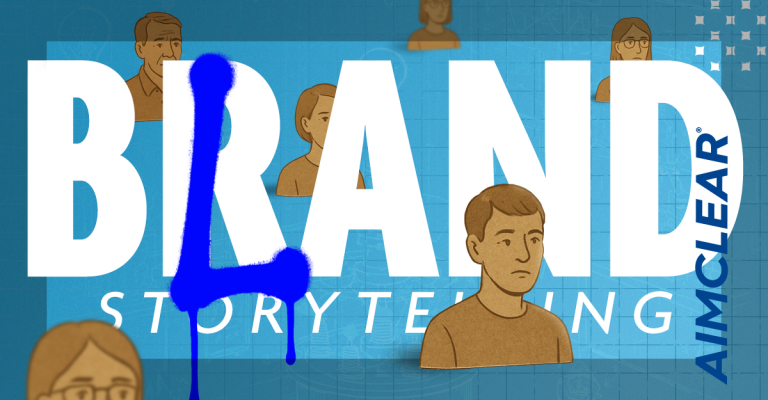Amplify Don’t Cannibalize
Top Performing Keyword SEO Mindfulness
The cannibalization of free organic traffic by paid ads is something paid search marketers and SEOs should monitor and track carefully when evaluating a client’s overall site health and launching paid campaigns. What is ads cannibalization? It’s running ads for keywords that are ranking #1 in the search engine results pages (SERPs), have an answer box, a featured snippet, etc. Most of the time the cannibalization is seen with branded terms like a company name.
Before paid marketers get their feathers ruffled, let us be really clear. We aren’t saying you should never bid on a number one ranking keyword (our own paid media team often does this!) – we’re saying, if SEO is killin’ it, why pay for free traffic (and more importantly, conversions) that you’re already getting? What’s critical is that you test to see what is best for each client, and each situation.
The PPC and SEO Rub
It’s easy to make PPC campaigns look great when you are bidding on branded keywords for organically ranked pages that have earned the top spots in the SERPs. A couple of questions you might want to consider first:
- Should you bid on a #1 ranking branded keywords?
- Do brand campaigns bidding on top organically ranking terms hurt the site organically?
SEOs and paid marketers have been head-to-head like Bugs Bunny and Yosemite Sam for decades over this situation. The question of whether to bid on top SEO keywords is something a solid integrated marketing approach can help answer and evaluate. Unless a client has an unlimited advertising budget for brand terms, marketers need to strategically use those dollars. The PPC team working together with their SEO counterparts to identify the optimal keywords to focus the spend, will yield the greatest opportunity for total search audience growth.
Case in Point
Let’s review a quick case study where AIMCLEAR‘s paid search marketers and SEOs worked together to strategize the best tactic for a client project. Over the last few months this client’s company name and branded terms have seen a slow bleed of their organic click-through rate (CTR) and ranking.
Before the new branding campaign started, the rank for the brand’s company name was a steady 1.0 and the brand’s terms fluctuated from 1.02 – 1.11 average rank (Google Search Console data below). At the end of April, the pandemic brought a more conservative ad spend and the average rank slowly began to improve for both branded terms and the company name. The ads went live again in May and an almost unnoticeable drop began. On June 19th the average position for the brand’s name bottomed out at an all new low average ranking of 1.96. On the 20th, the ads were paused for review and we saw our organic rank rebound overnight. Then as soon as the ads were reactivated, the site’s rank for the company name dropped and has continued to drop to 1.87 as of June 27th.
Some marketers might say, “So what? It’s less than a full position in the ranking.” The data for this particular client shows a small drop of only .1 in rank exponentially affects the CTR of the brand’s organic queries. Historically, position 1.0 queries have a CTR as high as 60% with an average CTR of 37.10%. In the table below you can see that the average CTR for a query ranking 1.0 through 1.3 and as you’d expect, as the position drops so does the average CTR – but not at the same rate.

If we look specifically at our client’s brand name we see CTR in the graph below swing between a low of 23.87% to a high of 53.7%. When the ads were paused, we saw the brand’s CTR nearly double to 77.1% and began to slide back into the mid-forties when the ads were turned back on.
Jumping into Google Analytics we likewise see a correlation in the graph above which shows goal conversions rate (CVR) increase to 3.45% on June 21st. Prior to that 2.97% was the highest CVR. When something like this is identified it is an opportunity to discuss conversion rate optimization(CRO) with the paid and organic teams to make more strategic integrated marketing decisions. A team may decide that their ad dollars would be best spent pausing ads on brand and going after complimentary brand terms or non-brand terms ranking further down page one of the SERPs.
Integrated Performance Marketing
In a recent #serpstat_chat the question was posed, “For the #PPC pros – what kind of things do you think SEOs can learn from what we do and how we do it? And for the #SEO pros, what can PPC pros learn from what you do?” #serpstat_chat
We think SEOs and Paid Search teams need to learn to work together in the true harmony of integrated performance marketing. But let’s shove the mushy stuff aside and dig into this. What can we learn from each other?
What can paid search marketers learn from SEOs?
Paid search marketers can learn from SEOs when to spend ad dollars on branded terms and when the data like CTR, Ranking, CVR, etc. proves the organic traffic is already yielding results. AIMCLEAR SEOs and paid search marketers work together to understand:
- Are SEO efforts to increase and maintain a keyword rank actually working?
- Are we getting enough clicks?
- Are the right people finding the page?
- Are the visitors converting?
If we aren’t communicating and making decisions together, both sides are wasting the client’s time and money.
High-ranking keywords are beautiful but if those clicks aren’t turning into conversions the traffic doesn’t matter. SEO and PPC need to decide when is the right time to compete against each other. To put it simply – if we aren’t communicating and making those decisions together, both sides are wasting the client’s time and money.
Before you go all Yosemite Sam, TEST! We acknowledge that there are circumstances where you need to bid on brand terms. For instance when a competitor is bidding on your brand’s name and you need to protect the brand. But don’t blindly start bidding and driving up PPC costs. Test to see if you need to bid to keep your conversions. Just because some brand is bidding on your company name doesn’t mean that users are going to automatically click their ad. You have brand awareness on your side. If your brand is the search query and your site offers an awesome user experience, easy buying process, etc. you may still be converting well plus saving ad spend. Test first to determine if your conversions have dropped enough to warrant bidding. If they have, then of course SEO will have to take the possible losses on the chin. An integrated marketing approach helps the C-Suite understand why organic numbers might be down, and helps justify why paid search needs more budget.
What can SEOs learn from paid search?
On the flip side of this PPC vs SEO coin, is that SEO likewise has a lot to learn from paid search. A quick and simple example and one of our favorites is getting to a winning messaging strategy. Let’s say your site is ranking really well for branded terms but your click-through rate is garbage. It’s possible that the content/messaging just isn’t doing it for the users. How do you test different messages without risking your page rank? Work together with your PPC team to arrange a number of ads with key messages you want to test. Run ads for a specified time and when the clear winner is revealed, change the messaging in your off-page and on-page content to meet your (now understood) users’ needs. Using ads to test messaging is the easiest way to increase organic CTR without ever touching your site and risking the loss of page rank. Plus, if your CTR is garbage and ranking high, you have a very small window of time to fix the problem before the search engines see your result is not getting the clicks, and may demote your link.
@MorganCrozier is on to something here in his #serpstat_chat tweet if SEO and paid search are siloed and not working together.
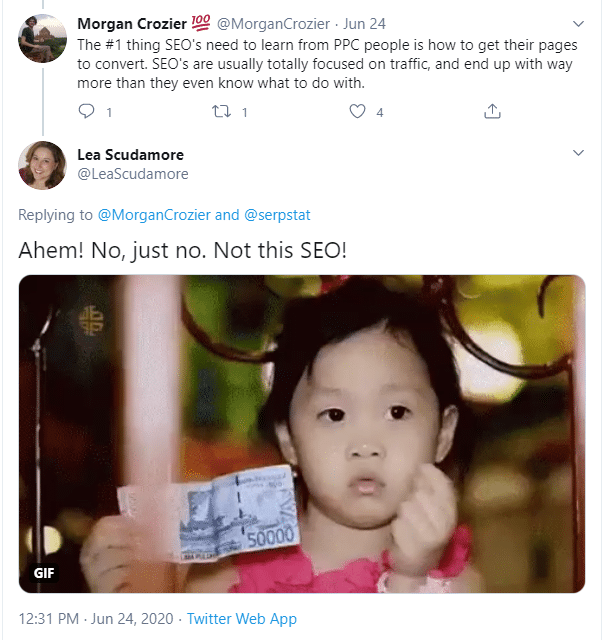
But not this integrated performance marketing agency – show us the conversions! We understand that the job of SEO does not begin with ranking and end with traffic. Traffic that doesn’t convert is bandwidth wasted. We emphasize whole-health website optimization and multi-channel strategies to ensure we aren’t spending money on what would have been free clicks and organic conversions. We offer clients transparency and guidance based on data-driven strategies to determine when the situation calls for spend on branded terms.
Our teams stand ready to partner with yours. Contact us to learn more about our integrated approach and let us know how we can help grow your business.

